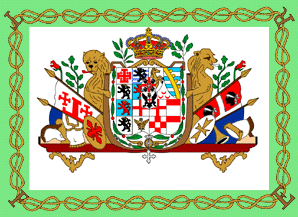
by Jaume Ollé, 8 August 1999

Last modified: 2020-12-28 by rob raeside
Keywords: italy | sardinia | sardegna | kingdom of sardinia |
Links: FOTW homepage |
search |
disclaimer and copyright |
write us |
mirrors
See also:
I have questions about the flags of Sardinia on the 1862
Bromme chart and the 1863 Johnson chart. All sources I have
consulted indicate that in 1848 Sardinia began using the flag
which later became the flag of the unified Kingdom of Italy until
1946, the green/white/red tricolour with the blue bordered red
shield and white cross of Savoy in the centre (white) stripe.
Yet both of these charts show as the ensign of Savoy the blue
flag with red canton, layered white and red crosses, and a crown
over the centre most red cross, as shown here as State
Flag 1816, which was supposed to have been obsolete after
beginning in 1848. FOTW indicates that this was the state flag
from 1816 to 1848. The 1862 Bromme chart
indicates that it is the naval ensign (Kreigsschiff). It is
merely labelled 'Kingdom of Sardinia on the 1863 Johnson chart,
and no other Sardinian flag is shown. The 1862 Bromme chart
also shows a naval jack (National Go:sch), which is the same as
shown as Jack 1816 but with the addition of
the crown in the same location as on the canton of the naval
ensign; the white Merchant Ensign shown
(with some slight detail differences, but no crown added); and
the Pilot Signal (Lootsensign) as shown ,
but again with the addition of the crown.
I understand that 19th century flag charts often perpetuated
outdated information, as is the case with the 1862 Bromme chart,
which shows an ensign for Texas (obsolete since 1846) and 30 star
flags for the United States (obsolete since 1851). However,
I would think that Sardinia was an important enough maritime
power in the 1860s that such a major change in its flags as that
made in 1848 would have been picked up by flag charts 14 and 15
years later.
Devereaux Cannon, 4 June 2001
I located some old Italian postcards containing Italian
kingdom flags and CoA's, including the flag behind the lady in
<www.antiquariumitalia.com>
. Anyone recognizes it ?
Dov Gutterman, 25 July 1999
That's the Sardinian Royal Flag (sometimes called
"standard") from 1848 to 1860
Norm Martin, 26 July 1999
It Is the royal standard of Sardinian (later Italian) Kingdom
1848 -1860. I posted this flag and the shade of green border is
(in my image) very different (I followed W. Smith)
Jaume Ollé, 1 August 1999
From about 1814 to 1848 there was only the Royal standard
(Kingdom of Sardinia, of course): a white flag with a blue
border. At the centre the Great Arms of the kingdom. In the blue
border a gold decoration made of Savoy knots and four letters F E
R T in the corners.
Source: Gino Galuppini, Franco Gay, "Insegne
bandiere distintive e stemma della Marina in Italia", in
Rivista Marittima, 1992.
Pier Paolo Lugli, 18 July 2000
The Sardinian Royal Standard flag above presents on the left
side of the coat of arms a red flag, white crossed with four
moor's heads.
I am surprised : in my opinion, this flag should be the
traditionnal Sardinan Flag (white, red-crossed).
Jerome Sterkers, 16 August 2000
Of course, white, red-crossed.The oval shields near the big
shield is wrongly coloured too. Left shield must be red with
white cross (St Lazarus Order). Right shield must be white with
red cross (I think, Genoa)
Victor Lomantsov, 16 August 2000
I agree with you, but is no my mistake. It is Exactly as it
shown in W. Smith's book.
Jaume Ollé, 16 August 2000
At J.W Norie - J.S. Hobbs: Flaggen aller seefahrenden
Nationen, 1971 [nor71] (original
print 1848):
190. Standard of Sardinia (Merchant the same as Kingdom without
the Crown.) - White with a green border, embelished with dark
green vines and in the corners the yellowish letters 'F', 'E',
'R', and 'T', from bottom hoist against the clock (since they are
readable from the outside of the corners), with on the white a
shield accompanied of four flags, dexter a red flag showing near
the hoist two small white crosses with before and below it a red
flag with a white cross throughout charged with a red cross with
slightly shorter arms, and sinister a white flag with a red eagle
(rotated to appear upright), and below and before it a flag with
a cross of St. George.
Peter Hans van den Muijzenberg, 12 November 2001
Concering the letters FERT, according to <web.tiscali.it>
it seems to be a motto of the Savoia family. The site offers
"Fortitudo eius Rhodum tenuit" (His [Amedeo the 6th's]
value kept Rhode") as an explanation, along with
"Foedere et religione tenemur" (we are kept together by
the pact and religion)
Manuel Giorgini, 29 November 2001
Amedeo (Amedee in French) VI, the so-called "Green
Count" (1343-1383) because of his tournament livery,
expanded the County of Savoy over Switzerland and Italy. He
fought against the Ottomans, seized Gallipoli and defended
Rhodes. He died of plague during fights in the Kingdom of Naples.
Ivan Sache, 29 November 2001

by Jaume Ollé and Jorge Candeias , 6 November
1998
The flag with the crown on it is the ensign and also the flag
used by the military installations in ports and by diplomatic
residences abroad. It was adopted 30 December 1814 by letters
patent of the King, Emanuel I. It was superceded on 15 April 1848
by a new ensign. As a state and port flag, it was authorized for
a short time only, 6 March 1848 - 4 June 1848.
As a merchant flag, the same design but without the crown was
used, which was also used at consulates abroad (as opposed to
diplomatic residences). Although also adopted 30 December 1814,
it was more formally codified on 15 January 1827 by a regulation
adopted for the merchant marine.
Dave Martucci, 12 October 1999
I'm not sure about the date of adoption of this flag, but
Zigiotto in vexilla Italica 2-24 shows a different pattern for
"navy ensign" 1814-1816. If until 1816 the flag that
Zigiotto shows was in use, we can assume that the flag quoted
above , was surely adopted in 1814 for other use, was adopted as
ensign in 1816.
Jaume Ollé, 19 October 1999
At J.W Norie - J.S. Hobbs: Flaggen aller seefahrenden
Nationen, 1971 [nor71] (original
print 1848):
191 Kingdom of Sardinia - As above but with the arms of the inner
red cross going only ca. a third of those of the white cross it
rests on, and the crown fitting within the white space available
in that manner, and with over it a pennant with the hoist a cross
of St. George, and the fly red, forked 1/6th, the upper split
shown as white. Blue really dark, here.
Peter Hans van den Muijzenberg, 12 November 2001
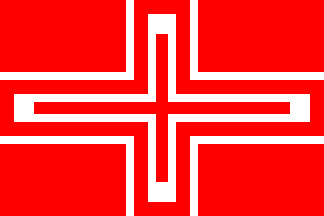
by Jaume Ollé and Jorge Candeias, 6 November
1998
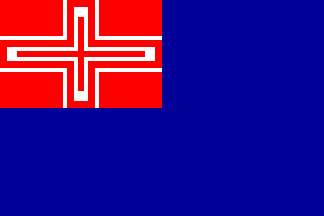
by Jaume Ollé and Jorge Candeias, 6 November
1998
Alfred Znamierowski, in [zna99[,
show this flag at p. 89 as: "Sardinia 1815-1848 War
Ensign". However, it looks strange: 29mm x 73mm overall with
canton of 20mm x 30mm. Has the lower portion of the flag been
"chopped-off"?
I reckon that it should be 2:3 ratio. Also, the width of the main
cross (white) is much thicker. He, of course may just have it
right!
Martin Grieve, 10 August 2003
I cannot place my hand on the recent article by Whitney Smith
on the subject of Sardinian flags, but I do have a specification
based on the illustration of the 1815 - 48 war ensign contained
in it. The flag shown by Whitney Smith is in proportions of
2:3, with a canton of 1/4 the flag. I have the width of the
crosses at 15, 11, 7 and 3 (out of a canton width of 60), with
the first stripe the full length of the canton at 90, then 86 and
78 respectively. I cannot, of course, guarantee the
accuracy of my spec., but I can say that it looked right when
compared to the illustration.
On the other hand, according to a flag chart published by R H
Laurie in 1842 the disposition and width of the crosses is as per
Znamierowski, although the ratio is shown as 2:3.
Christopher Southworth, 10 August 2003
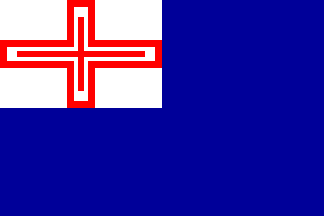
by Jaume Ollé and Jorge Candeias, 6 November
1998
The flag with the white canton bearing some of the crosses is
unknown to me. What is the basis for it? I have a very good
source of the history of Italian flags by Aldo Ziggioto and
it is not mentioned.
Dave Martucci, 12 October 1999
This information was provided by me, and was taken from one of
the last issues of Vexilla Italia and was writen by Mr.
Zigiotto, and it is then probably more recent than your
information from Zigiotto.
Jaume Ollé, 17 October 1999
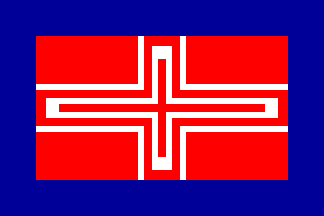
by Jaume Ollé and Jorge Candeias, 6 November
1998
At J.W Norie - J.S. Hobbs: Flaggen aller seefahrenden
Nationen, 1971 [nor71] (original
print 1848):
193 Sardinian Signal for a Pilot - As above, except that it's
based on the canton of State Flag 1816. Blue
much lighter than in State Flag 1816, though.
Peter Hans van den Muijzenberg, 12 November 2001

by Jaume Ollé and Jorge Candeias, 6 November
1998
After 23 March 1848 the Kingdom of Sardinia adopted the
Italian tricolor on which it added the Savoy shield with blue
border. Later, on 15 April 1848, it adopted a naval ensign and
war flag, which was the same flag but with crown above the
shield. Those flags became the flags of the
Kingdom of Italy.
Jaume Ollé, 13 October 1998